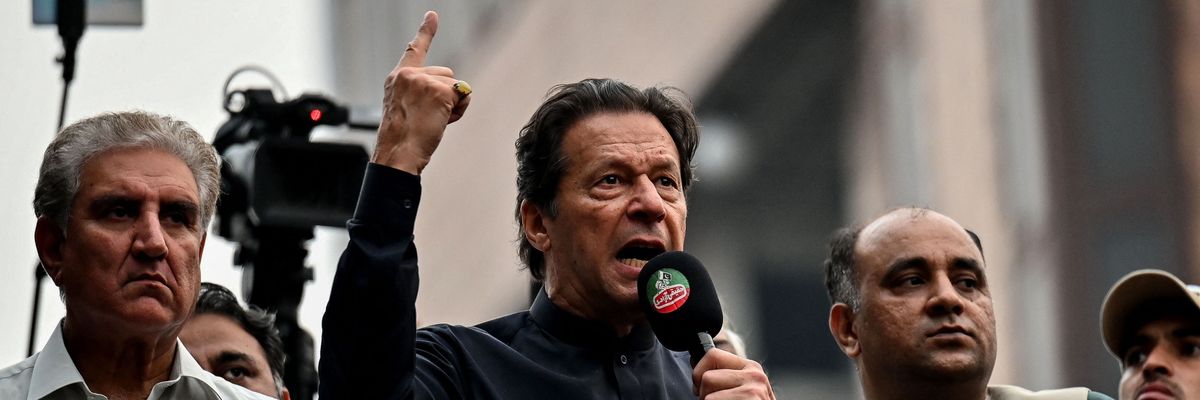When I interviewed Imran Khan in February 2023 he was facing multiple criminal charges after being deposed as prime minister of Pakistan. He had also recently survived an assassination attempt. Khan was blunt about his interpretation of events. “My government was removed through a conspiracy,” he told me.
Since then, information has come to light which seems to add credibility to his claim of a conspiracy, orchestrated by the U.S., which led to his removal. There is now considerable evidence that the United States orchestrated his removal for tactical reasons and later rewarded his usurpers for doing it.
Meanwhile, Khan has been the target of an endless campaign of judicial “prosecutions” by the U.S.-installed government. Many of these legal efforts have already been declared null and void in court, but this has not stopped the government from adding new ones.
The actions against Mr. Khan limit the choices available to voters, undermining U.S. claims to leadership in this area. That puts the U.S. in the ironic position of appearing to subvert one democracy in its self-described quest to defend another.
Khan is now imprisoned after several arrests, some carried out extrajudicially, and after being convicted in a trial that the nation’s Supreme Court has ruled was conducted illegally.
Khan remains the most popular politician in his country, a nuclear power and the fifth most populous nation on Earth.
New information suggests that Khan was punished for defying a U.S. demand to support Ukraine against Russia’s invasion. The reputational harm to the U.S. is made even worse by the fact that Mr. Khan’s illegal trial concerned the release of information about U.S. interference in Pakistan’s democracy—an accusation denied by both Khan and the journalists involved.
Here are four reasons the United States should reverse itself, call for Mr. Khan’s release, and support his ability to run for office.
1. Democratic Principles
The United States claims to be a leading voice for world democracy. Whatever one may think of that claim, democracy requires an open, fair, and democratic political process. The actions against Mr. Khan limit the choices available to voters, undermining U.S. claims to leadership in this area. That puts the U.S. in the ironic position of appearing to subvert one democracy in its self-described quest to defend another.
Khan remains the most popular leader in Pakistan, while the government that is persecuting him is very unpopular.
2. Rule of Law
Khan’s detention and trials are a clear abuse of the judicial system for political purposes.
3. Political Stability
Cheating the Pakistani voters out of open and fair elections will lead to further chaos and instability in this populous and nuclear-armed country. It could also lead to more instability in the region. (Pakistan shares borders with Iran, China, and India.)
4. U.S. Strategic Interests
American intervention in Pakistan’s affairs was widely resented even before these latest revelations. The current U.S.-backed government is highly unpopular, while Khan retains wide support. The U.S. role in Khan’s removal has intensified anti-American feeling.
More Background
An August 2023 article by Ryan Grim and Murtaza Hussain in The Intercept contained information from a secret U.S. State Department “cypher” (something like a cable), which indicated that the Biden administration pressured Pakistani officials to remove Khan from power. Their motive? Khan refused to take sides in the Russia-Ukraine conflict. He wasn’t soft-spoken about it.
“Are we your slaves?” he asked rhetorically. “What do you think of us? That we are your slaves and that we will do whatever you ask of us?... We are not part of any alliance.”
That speech was given on March 2, 2022. On March 7, two State Department officials met with Pakistan’s ambassador to the United States. The cypher indicates that one of them, Assistant Secretary of State for the Bureau of South and Central Asian Affairs Donald Lu, said “people here and in Europe are quite concerned about why Pakistan is taking such an aggressively neutral position (on Ukraine), if such a position is even possible. It does not seem such a neutral stand to us.” (“Aggressively neutral” is an interesting phrase.)
The document also reports that Lu said this:
Let us wait for a few days to see whether the political situation changes, which would mean that we would not have a big disagreement about this issue and the dent would go away very quickly. Otherwise, we will have to confront this issue head on and decide how to manage it.
And this:
I think if the no-confidence vote against the prime minister succeeds, all will be forgiven in Washington because the Russia visit is being looked at as a decision by the prime minister. Otherwise, I think it will be tough going ahead.
Nice little country you’ve got here. It’d be a shame if something happened to it…
As The Intercept notes, “The day after the meeting, on March 8, Khan’s opponents in Parliament moved forward with a key procedural step toward the no-confidence vote.” Pakistan scholar Arif Rafiq told The Intercept:
What you have here is the Biden administration sending a message to the people that they saw as Pakistan’s real rulers, signaling to them that things will be better if he is removed from power.
Rafiq also said:
While the Biden administration has said that human rights will be at the forefront of their foreign policy, they are now looking away as Pakistan moves toward becoming a full-fledged military dictatorship.
